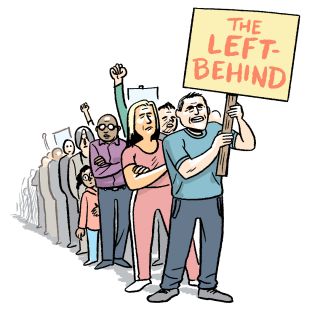Temporary Budgetary cost of living measures failing low income households

‘Tracking Distributive Effects of Budget Policy – 2023 edition’ is the latest publication in Social Justice Ireland's Budget series. The briefing finds that Budget 2023’s legacy will be to widen further the gap between the better off and those on the lowest welfare and work incomes. In particular, the Budget provided least for the large cohort of workers earning around €15 to €20 per hour. Government must not repeat this mistake in Budget 2024. The analysis shows that the legacy of Government’s cost of living measures has been to widen further the gap between the better off and those on the lowest welfare and work incomes, with few Budgetary measures targeted at low income households where they can have most impact.
Distributive Analysis of Cost of Living Measures, February 2022-July 2023
Since February 2022, Government have announced a series of taxation, welfare and electricity credit measures intended to assist all households with cost-of-living pressures. Given the challenges that so many households face in making ends meet, particularly those on the lowest incomes, much of this assistance is welcome and badly needed. However, Social Justice Ireland analysis indicates that there is a marked difference in the way that the cost-of-living measures have been delivered to households.
They have included temporary measures, such as electricity credits and one-off additional welfare and fuel allowance payments, alongside permanent measures announced as part of Budget 2023 such as changes to the value of core welfare payments and changes to tax credits and bands. It is a concern that in time the temporary measures will disappear, but the permanent changes will remain, as these permanent measures have favoured better off households.
Increasing the Rich-Poor Gap
Budget 2023 increased the Rich-Poor gap by €199 in the year, a gap which now stands at almost €1,000 per week. Budgetary policy should aim to alleviate the pressures on households who can least absorb cost of living increases, rather than increase the disposable income of wealthier households.
Distributive Analysis of Government Measures, 2020-2023
The briefing also examines the cumulative impact of changes to income taxation and welfare over the Government’s three Budgets. This analysis captures the taxation and welfare measures announced in those Budgets plus various cost-of-living crisis energy credits and welfare payments announced in 2022 and 2023.
Households with Jobs 2020-2023
Comparing 2020 to 2023 for households with jobs, the weekly income gains range from a €8.84 cent per week for low-income couples on €30,000 to €55.61 per week for couples with incomes over €80,000. Earners on both the living wage and the minimum wage gain more that the value of taxation, welfare, and one-off cost of living changes on account of the increase in the level of those hourly rates.
Households dependent on Social Welfare
Among households dependent on welfare, the gains have ranged from €28.61 per week for single unemployed individuals to €72.28 per week for unemployed couples with 2 children over 12 years of age. The gains are largest for welfare dependent household with children who benefit from a one-off child benefit top-up and a one off back to school allowance increase in 2023. However, these payments will not carry over to 2024 income and the relative standing of these households is likely to deteriorate in future years.
Impact on low-income households
Social Justice Ireland has consistently argued for the prioritisation of low-income welfare dependent families in Budgetary policy and welcome how recent cost of living supports have assisted this group. However, we are concerned that the permanent changes to income taxation levels in recent Budgets have shifted away from this approach and regrettably expect that much recent progress will be reversed. The analysis highlights how low-income working families, those with incomes below the standard rate income tax threshold, gain least from the Government’s measures over the past three years. It also highlights the marked difference in impacts of temporary gains from one off cost of living supports and permanent gains from welfare and taxation changes.
Download ‘Tracking the Distributional Effects of Budget Policy – 2023 edition’ here.
Amongsingle people in 2023 Budget 2023’s permanent changes to taxes and welfare deliver the following average weekly gains:
- An unemployed person: + €12.10
- An earner on €30,000: + €3.65
- An earner on €80,000: + €15.92
- An earner on €100,000: + €15.92
Among couples in 2023 the Budget’s permanent changes to taxes and welfare deliver the following average weekly gains:
- A pensioner couple: + €22.98
- An unemployed couple: + €20.08
- With 1 earner on €30,000: + €0.78
- With 1 earner on €60,000: + €19.27
- With 2 earners on €100,000: + €31.84